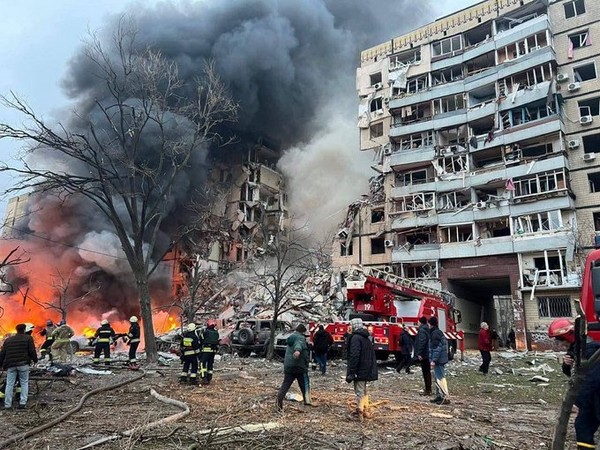This conflict exposes the weaknesses of depending on external military assistance.
Unexpectedly, the Russia-Ukraine conflict, has completed one year and is still volatile. This protracted conflict holds valuable lessons for nations, political leaders, military strategists and foreign policy makers. At the beginning of the conflict, it was widely assumed that it would be a simple walk through for the Russian forces. The amazing resistance of the Ukrainians, baffled and surprised military observers throughout the world. Russia is reckoned as a major military superpower by any standards, and nobody expected that they would encounter a formidable opposition. But the battle slipped beyond weeks and months, and has reached a milestone of having completed a full year with no clear outcome. The battle continues unhindered and several nations around the globe are feeling extreme discomfiture at the economic consequences that the war has created. Be that as it may, a diagnosis of the conflict so far throws up interesting conclusions.
The Russians made the cardinal mistake of grossly underestimating the Ukrainian potential to fight back resolutely and with conviction. The constant refrain of all classical military strategists from Chanakya to Sun Tzu, Machiavelli, Frederick the Great, Clausewitz, Antoine-Henri Jomini, and Liddell Hart, is to never ever underestimate the enemy. It is apparent that Russian military intelligence faltered very badly, resulting in a flawed assessment of the Ukrainian potential.
Ukrainian forces are demonstrating the success of guerilla war tactics. Russia’s grip on occupied areas of south-eastern Ukraine is weakening, guerrilla forces loyal to Kyiv are killing pro-Moscow officials, blowing up bridges and trains, and helping the military by identifying key targets. It brings to mind the great guerilla strategist, Maratha chieftain Shivaji. His deep knowledge of the topography and guerrilla tactics like raiding, ambushing and surprise attacks on the Mughals are a military success story in itself. The Vietnamese had humbled the American military might by studying the tactics of Shivaji Maharaj. As a mark of respect, the statue of Chhatrapati Shivaji Maharaj stands proudly in the capital city of Vietnam—Ho Chi Minh city. They installed it as a tribute to the great Maratha warrior, as they successfully repelled the American might by employing guerrilla tactics perfected by Shivaji. The hitherto success story of Ukraine should serve as a warning to the warmonger Xi Jinping of China. From Xinjiang to Taiwan, across the Himalayan mountain range, Chinese forces are arrayed for onslaught. Simple guerrilla tactics in Xinjiang, to aggressive surprise strikes across the Tibetan plateau will be a humbling experience for the Chinese. President of Taiwan, Tsai Ing-wen can draw inspiration from the naval exploits of another great Maratha naval supremo, Kanhoji Angre. His naval guerrilla techniques made him a dreaded name to reckon with. Ukrainians used naval guerrilla techniques to destroy Russian warship Moskva. Snake Island has become a symbol of Ukrainian resistance. This war has reiterated the supremacy of guerrilla warfare.
Next this conflict exposes the weaknesses of depending on external military assistance. Though the United States, Germany, Sweden and Norway have contributed military assistance in the form of weapons to Ukraine, the reliance on external assistance has severe limitations. The genius of Prime Minister Narendra Modi needs to be appreciated in this context. His flagship program Aatmanirbhar Bharat Abhiyan and its five pillars aim at making India self-reliant. Ukraine is constantly begging for arms from European nations, President Volodymyr Zelenskyy is on repeated rounds of European capitals begging for arms and ammunition. The small European nations are unable to support a protracted battle, they are finding to their chagrin that their military resources are drying up fast. Can they keep giving aid interminably?
Globalization has exposed many nations to acute economic discomfiture, for a war happening thousands of kilometres away. Many nations have started an economic warfare by imposing sanctions on Russia. In retaliation Russia has also imposed sanctions, which has created an unprecedented energy crisis in Europe. Food prices have surged. Quantifying the costs of war is extremely complex, given the lack of authentic data as well as the difficulty of covering the complex economic, social, and political effects of war with typical indicators like GDP.
Aeschylus had correctly predicted ages ago that “In war, truth is the first casualty”. This war is a reiteration of that dictum. The social media, print and visual media are inundated with estimates of war casualties and the great human suffering that the war has inflicted. While US officials estimate that more than 200,000 Russian soldiers have been killed or wounded since the start of the invasion, UK estimates the loss of Russian soldiers at about 60,000. No data is reliable, there are hidden agendas in exaggeration.
Vladimir Putin should not be driven by the West to desperation to use tactical nuclear weapons. Better to guide him into an honourable exit. Recently, the US did it in Afghanistan. Withdrawal is preferable to a Pyrrhic victory
Dr G. Shreekumar Menon IRS (Rtd), Ph.D. (Narcotics) is former Director General, National Academy of Customs, Indirect Taxes & Narcotics.

